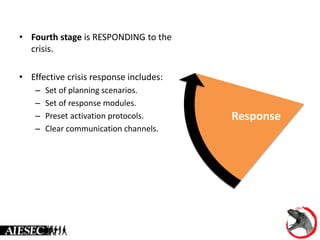Crisis management
- 2. • The word crisis comes from two Chinese words; Danger and Opportunity. Danger Opportunity Crisis Crisis: is any event that is expected to lead to, an unstable and dangerous situation affecting an individual, group, or whole organization
- 3. Crisis Management • Crisis Management: is the process by which an organization deals with a major event that threatens to harm the organization, its stakeholders, or the general public.
- 5. Identification • First Stage of crisis management is IDENTIFYING the crisis’ nature. • Crisis can be clustered into: – Natural crisis: occur due to natural disasters. – Organizational Misdeed crisis: occur when management take actions that harm stakeholders without suitable precautions. – Deception crisis: occur due to lack of transparency from the management about certain information. – Workplace violence crisis: occur when member commit violence to other members. – Skewed values crisis: occur when short- term gain is favored and values are neglected. – Rumors crisis: occur when false information about an organization and its product hurt the organization’s reputation.
- 6. • Second Stage is PREPARING for the crisis. • Crisis preparation is done by: – Vulnerability Assessment: determine current and potential areas of operational and communications weakness. – Crisis Planning: are two types • Operational : What we do, who does it, and when it is done. • Communications: what do we say, who says it, how do we get the messages out. Preparation
- 7. • Third stage is PREVENTING the crisis from happening. • Crisis Prevention is occurred by: – Anticipate and Have a plan. – Respond immediately. – Do not over talk. – Always tell the truth. – Accept responsibility. Prevention
- 8. • Fourth stage is RESPONDING to the crisis. • Effective crisis response includes: – Set of planning scenarios. – Set of response modules. – Preset activation protocols. – Clear communication channels. Response
- 9. • Fifth stage is RECOVERING from the crisis. • Organizations must be able to carry on with their business in the middle of the crisis. • while simultaneously planning for how they will recover from the damage the crisis caused. • Crisis handlers must engage in the recovery plan while perusing the goal. Recovery
- 10. 5 Rules for Crisis Management 1. Being Unprepared Is No Excuse. 2. Know The Threats & Get Ready For Them. 3. You’ve Got 48 Hours. 4. Divide And Conquer. 5. Get Outside Help.
- 11. Every member can or must be part of the crisis solution
- 12. Always remember that every crisis can be managed.
- 13. Any Questions ??
- 14. Thank You













